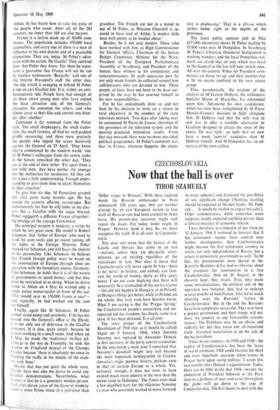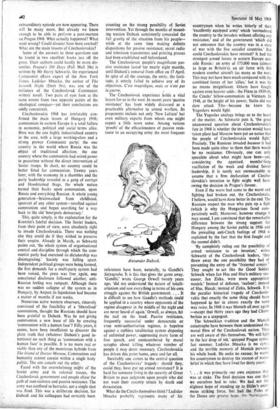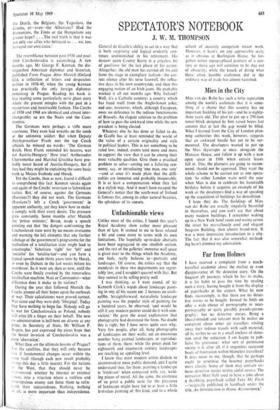Now that the ball is over
CZECHOSLOVAKIA TIBOR SZAMUELY
'Order reigns in Warsaw.' With these exultant words the Rusian ambassador to Paris announced, 138 years ago, that yet another attempt by an east European nation to free itself of Russian rule had been crushed by brute force. His present-day successor might well repeat the boast. For today 'order reigns in Prague.' However hard it may be, we must recognise the truth. It is all over in Czechoslo- vakia.
This does not mean that the history of the Czechs. and Slovaks has come to an end —nations, unless they are physically exter- minated, go on existing regardless of the vicissitudes of fate. Nor does it mean that Czechoslovakia will never again be free—there is no 'never' in history, and nobody can fore- cast the world of twenty, thirty or fifty years hence. I am not even implying that there will
necessarily be a restoration of the andel; regime —this did not happen in Hungary or in Poland;
in Hungary things got better, while in Poland, on the whole, they may even have become worse. What I am saying is that the 'Prague Spring,' the Czechoslovak people's astonishing and un- expected bid for freedom, has finally come to a close. It has been defeated. It is all over.
The story proper of the Czechoslovak Revolution of 1968 (for so it should be called)
began on 5 January 1968, when Antonin Novotny was replaced by Alexander Dubcek as first secretary of the party central committee. In the SPECTATOR a week later I remarked that Novotny's downfall 'might very well become the most important turning-point In Czecho- slovakia's tragic postwar history, perhaps. even in that of eastern Europe as a whole. Yet, curiously enough, .it does not seem to have evoked much more interest in the west than the recent coup in Dahomey.' The Times even shed a few dignified tears for the villainous Novotny ('a man who genuinely wanted to move forward
in many spheres') and dismissed the possibility of any significant change ('Nothing startling should be expected of the new leader, Mr Dub- cek ... It would be foolish to expect miracles'). Other commentators, while somewhat more sanguine, hardly expected anything greater than a limited measure of economic reform.
I was, therefore, in a minority of one when on 12 January 1968 1 ventured to forecast that if the communist regime 'loses control over further developments then Czechoslovakia might become the first communist country to attain, not only independence of Russia, but a return to democratic government as well.' To be fair, my presentiments were shared in the Kremlin. Brezhnev & Co. had no illusions about the prospects for communism in a free Czechoslovakia. And on 21 August, at the eleventh hour, they struck. True, they made some miscalculations; the political side of the operation was bungled; they had to undergo several months of humiliation. This led to much rejoicing over the Russians' failure in Czechoslovakia.' But in the end the Russians have been completely successful. They now have a puppet government and their troops will not leave the country in any foreseeable circum- stances. The Politburo may be an obtuse and ruffianly lot, but they know one all-important truth : historical materialism is on the side of the big battalions.
'Twice in our century—in 1938 and 1948—the capital of Czechoslovakia has been the focus of world attention; 1968 could become the third and most important occasion when events in Prague burst upon world politics.' I wrote this two months after Dubcek's appointment. Today there can be little doubt that 1968—despite the abdication of President Johnson or the Paris riots or a plethora of wars and crises throughout the globe—will go down as the year of Czechoslovakia. The first books to deal with this
extraordinary episode are now appearing. There will be many more. But already we 'know enough to be able to perform a post-mortem on Prague 1968. What actually happened? What went wrong? Could disaster have been averted? What are the main lessons of Czechoslovakia?
Some of the answers to these questions can be found in two excellent books just off the press. Their authors could hardly be more dis- similar. Prague's 200 Days (Pall Mall 50s) is written by Mr Harry Schwartz, the experienced Communist affairs expert of the New York Times. Ladislav Mnacko, the author of The Seventh Night (Dent 36s), was one of the initiators of the Czechoslovak Communist writers' revolt. Two pairs of eyes look at the same events from two opposite points of the ideological compass—yet their conclusions are oddly concurrent.
Czechoslovakia 1968 has irrefutably con- firmed the main lesson of Hungary 1956; communism in eastern Europe is a total failure in economic, political and social terms alike. Here was the one highly industrialised country in the area, with a large working-class and a strong prewar Communist party; the one country in the world where Russia was the object of traditional affection; the one country where the communists had seized power in peacetime without the direct intervention of Soviet troops. In short, no country could be better fitted for communism. Twenty years later, with the economy in a shambles and the party leadership revealed as a gang of corrupt and bloodstained thugs, the whole nation turned their backs upon communism, upon Russia and everything Russian. A whole young generation—brainwashed from childiniod, ignorant of any other system—revolted against communism and began searching for a way back to the old 'bourgeois democracy.'
This, quite simply, is the explanation for the Kremlin's fateful decision. The Soviet leaders, from their point of view, were absolutely right to invade Czechoslovakia. There was nothing else they could do if they wished to preserve their empire. Already in March, as Schwartz points out, 'the whole system of organisational control and discipline through which the com- munist party had exercised its dictatorship was disintegrating.' Society was falling apart. Independent political groups were being formed, the first demands for a multi-party system had been voiced, the press was free again, one sensational disclosure followed another, anti- Russian feeling was rampant. Although there was no sudden collapse of the system as in Hungary, by August its liquidation had become a matter of months if not weeks.
Numerous naive western observers, sincerely convinced of the feasibility of a 'liberalised' communism, thought the Russians should have been grateful to Dubcek. Was he not giving communism a new lease of life by creating 'communism with a human face'? Fifty years, it seems, have been insufficient to discover the plain truth that (whatever Dubcek's good in- tentions) no such thing as 'communism with a human face' is possible. It is no more real or viable than any of the monstrous hybrids from The Island of Doctor Moreau. Communism and humanity cannot coexist within a single body politic. The one cancels out the other.
Faced with the overwhelming might of the Soviet army and its colonial troops, the Czechoslovak government and people chose the path of non-violence and passive resistance. The army was confined to barracks; not a single shot was fired. This was a deliberate decision, for Dubcek and his colleagues had certainly been
counting on the strong possibility of Soviet intervention. Yet through the months of mount- ing tension Dubcek consistently concealed the full gravity of the situation from his people— while at the same time making definite dispositions for passive resistance; secret radio and television transmitters and printing presses had been established well beforehand.
The Czechoslovak people's magnificent pas- sive resistance lasted for nearly eight months, until Dubcek's removal from office on 17 April. In spite of all the courage, the unity, the forti- tude, it utterly failed to achieve any of its objectives. C'est magnifique, mais ce West pas la guerre.
The Czechoslovak experience holds a vital lesson for us in the west. In recent years 'passive resistance' has been widely discussed as a practicable Alternative to armed warfare. Its proponents include not only 'New Leftists' but even military' experts from whom one might expect a little more sense. Among various 'proofs' of the efficaciousness of passive resis- tance to an occupying army the most frequent
Alexander Dubcek.
references have been, naturally, to Gandhi's Satyagraha. It is this that gives the game away. 'Gandhi,' wrote George Orwell twenty years ago, 'did not understand the nature of totalit- arianism and saw everything in terms of his own struggle against the British government. • . It is difficult to see how Gandhi's methods c`ould be applied in a country where opponents of the regime disappear in the middle of the night and are never heard of again.' Orwell, as always, hit the nail on the head. Passive resistance, frequently successful under democratic or even semi-authoritarian regimes, is hopeless against a ruthless totalitarian system disposing of unlimited power, suppressing every form of free speech, and unencumbered by moral scruples about killing whatever number of people it may deem necessary. Czechoslovakia has driven this point home, once and for all.
Inevitably one comes to the central question of the Czechoslovaks' tragedy : should they, could they, have put up armed resistance? It is hard for someone living in the security of Great Britain to pass judgment upon people who did not want their country struck by death and devastation.
What do the Czechs themselves think? Ladislav Mnacko probably represents many of his
countrymen when he writes bitterly of their 'excellently equipped army' which 'surrendered the country to the invaders without offering any -resistance,' and of the government 'which did not announce that the country was in a state of war with the five socialist countries.' But could Czechoslovakia have resisted? It bad the
strongest armed forces in eastern Europe out- side Russia : an army of 175,000 men (almost
as large as Britain's), an air force with 600 modern combat aircraft (as many as the ass). This may not have been much compared with the combined forces of her 'allies,' but it was by no means insignificant. Others have fought against even heavier odds : the Finns in 1939-40, the Czechs' fellow-communists in Vietnam. In 1948, at the height of his power, Stalin did not dare attack Tito—because he knew the Yugoslays would fight.
The Yugoslav analogy brings us to the heart of the matter. As Schwartz puts it, 'the great unanswered question about Czechoslovakia's fate in 1968 is whether the invasion would have taken place had Moscow been put on notice that the people of Czechoslovakia would fight.' Precisely. The Russians invaded because it had been made quite clear to them that there would be no resistance. Obviously, one can only speculate about what might have been—yet,
considering the agonised; - months'-long vacillation of the weak and divided Soviet -leadership, it is surely not unreasonable to assume that a firm declaration of Czecho- slovakia's intention to fight might well have swift the decision in Prague's favour.
Even if the worst had come to the worst and fighting had broken out, the Czechoslovaks, I believe, would have done better in the end. The Russians respect the man who puts up a fight (which is why the Hungarians fared com- paratively well). Moreover, however strange it may sound, I am convinced that the remarkable difference between the strong support for Hungary among the Soviet public in 1956 and the prevailing anti-Czech feelings of 1968 is explained by the fact that the first fought and the second didn't.
'By completely ruling out the 'possibility of armed resistance to an invasion,' writes -Schwartz of the Czechoslovak leaders, 'they threw away the one possibility they had of preventing the entry of the "fraternal armies." They sought to act like the Good Soldier Schweik when Jan Hus and Hus's military suc- cessor, Jan Zizka, were more appropriate models.' Instead of defiance, 'realism'; instead of Hus, Husak; instead of Zizka, Schweik. It is the peculiar historical tragedy of Czechoslo- vakia that exactly the same thing should have happened to her in almost exactly the same way twice. In 1968 it was Munich all over again
• —except that thirty years ago they had Cham- berlain as a scapegoat. The Schweikian tradition and the Munich catastrophe have between them undermined the 'moral fibre of the Czechoslovak nation. The' are well aware of this themselves. 'We will fight to the last drop of ink,' quipped Prague cynic, last summer. Ladislav Mnacko is no cynic. and the terrible memory of Munich pervade, his whole book. He seeks no excuse; be wants his countrymen to destroy the cocoon of make- belief in which they have lived for.thirty years : . . it was primarily our own existence the was at stake. The final decision was one that we ourselves had to take. We had not the slightest hope of standing up to Hitler's enor- mous striking force, but had the Poles or the Danes any greater hope the NorwgianN.
the Dutch, the Belgians,. the Yugoslays, the Greeks, or—even—the Albanians? Had the Rumanians, the Finns' or the Hungarians any greater hope? . . . The real truth is that it was not only our allies who betrayed us ... we, too, betrayed our own cause.'
The resemblance between post-1938 and post- 1968 Czechoslovakia is astonishing. A few months ago, Mr George F. Kerman, the dis- tinguished American diplomat and historian, published From Prague After Munich (Oxford 62s), a collection of letters and despatches written in 1938-40, when the young Kennan was practically the only foreign diplomat remaining in Prague. Reading his book is like reading some particularly eerie ghost story where the present mingles with the past in a mysterious and inextricable fashion. The Czechs of 1938 and 1968 are identical and almost inter- changeable; so are the- Nazis and the Com- munists:- The Germans were perhaps a trifle more courteous. They even laid wreaths on the tomb of the unknown soldier. But when Deputy Reichsprotektor Frank met the top Czech officials he minced no words: 'The German Reich, Herr Frank reminded his hearers, was not Austria-Hungary.' How true! Ambassador Chervonenko and Marshal Grechko have pro- bably never heard of Austria-Hungary, but if they had they might be explaining the same basic truth to Messrs Svoboda and Husak.
Yet the Czechs;then as now, found it difficult to comprehend this fact. Kennan speaks again and again of the Czechs' reversion to Schweikian tactics. But, of course, against the Germans (Russians?) they did not work. The Germans (Russians?) left a Czech 'government' in apparent authority, yet they knew how to make it comply with their every desire. The pressure grew constantly. Some months after Munich the 'prime minister,' Beran, made a speech pointing out that 'the dangers confronting the Czechoslovak state were by no means overcome and warning the left elements that any further sabotage of the government's programme for the realisation of a totalitarian state might lead to catastrophe.' Substitute 'right' for 'left' and 'socialist' -for `totalitarian'—and you have a typical speech made thirty years later by Husak, or even by Dubcek in the last weeks before his overthrow. So it went on, then as now, until the Czechs were finally crushed by the remorseless totalitarian machine. Nazi or Communist—what difference does it make to its victims? -
During the year that followed Munich the Czechs pinned all their hopes upon the outbreak of war. Their calculations were proved correct. War came and they were duly liberated'. TOday they have nothing to hope for. Nobody will go to war for Czechoslovakia or Poland, nobody Rill even lift a finger on their behalf. The new us administration is hell-bent on détente at any price; its Secretary of State, Mr William P. Rogers, has just expressed the pious hope that the Soviet invasion of Czechoslovakia was a mere 'aberration'.
What then are the ultimate lessons of Prague? For the satellites, that they will only become I ree if fundamental changes occur within the I SSR itself (though each new revolt probably brings .this day a little nearer). For the nations of the West, that they should never be manoeuvred. whether by internal or external :ogees, into a situation where a ruthless and unscrupulous enemy can force them to -relin- c uish their independence. Nothing, nothing at all, is more important than independence.








































 Previous page
Previous page